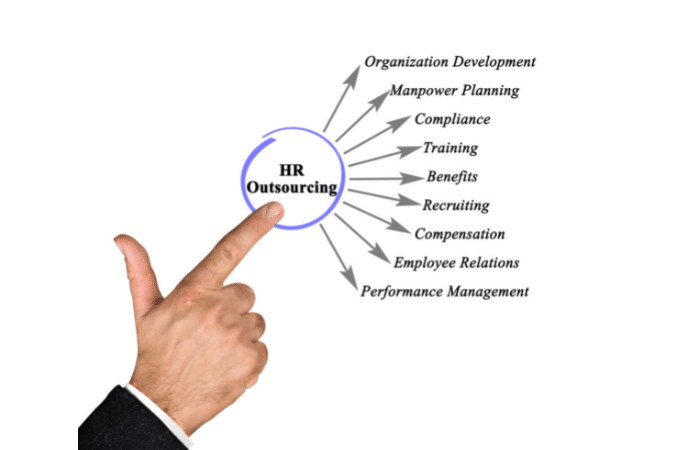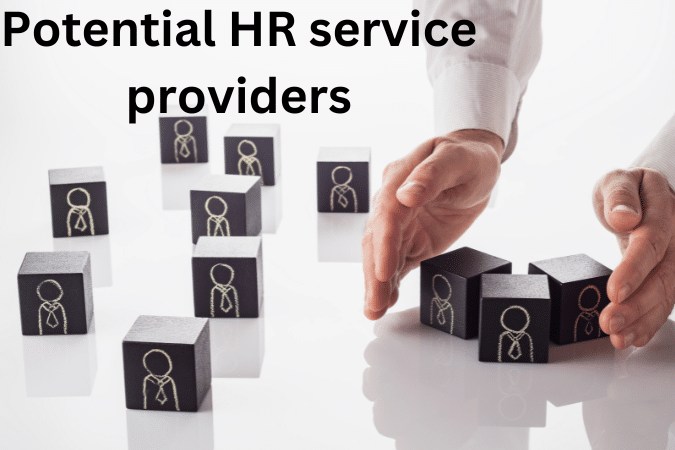
Outsourcing HR Services for Small Businesses


Table of Contents:
-
Importance of HR Services for Small Businesses
-
Navigating the HR Maze: Identifying Your Business’s Needs
-
Choosing the Right HR Service Provider – HR Services for Small Businesses
-
Evaluating Potential HR Service Providers
-
Enlist Steps to Evaluate Potential HR Service Providers
-
Comparing Different HR Service Providers
-
Cost Considerations for Outsourcing HR Services for Small Businesses
-
Keeping Up Effective Communication When Outsourcing HR Services for Small Businesses
-
Importance of Data Security and Confidentiality in HR Services for Small Businesses
-
Frequently Asked Questions – Outsourcing HR Services for Small Businesses
-
Bottom Line – Outsourcing HR Services for Small Businesses
Small businesses constantly strive to lower their expenses and maximize efficiency, but one of their biggest challenges is finding great human resources (HR) services while on a budget. Outsourcing HR services can be cost-effective to meet these needs without sacrificing quality. Successful businesses need quality HR services to ensure smooth operations, from handling the hiring process and onboarding new employees to developing an effective performance management system and regulatory compliance.
With so many options available, how do you decide which HR outsourcing is right for your business? In this post, we’ll discuss key factors to consider when choosing an HR service partner for your small business.
Importance of Outsourcing HR Services for Small Businesses

One of the most important decisions you can make is outsourcing its human resources functions. By outsourcing hr activities to an HR outsourcing company, small businesses can bring in experts at a fraction of the cost of hiring and managing HR staff. With HR outsourcing services, small businesses can access valuable HR expertise from recruiting and onboarding new employees, developing policies and procedures, ensuring compliance with employment laws, and performing health checks on existing staff.
Without this critical HR support, many small business owners would be unprepared when managing HR functions. In addition, outsourcing HR tasks gives small businesses a competitive advantage they otherwise can not enjoy without incurring additional costs.
Navigating the HR Maze: Identifying Your Business’s Needs
HR outsourcing is becoming increasingly popular among business owners. Businesses can free up their HR team to focus on more strategic HR functions. They are engaging an HR outsourcing company. HR outsourcing services can range from providing payroll systems or recruitment management support to complete HR service solutions. When identifying HR needs, it’s essential to consider which HR functions can be effectively and efficiently managed by a third-party provider instead of internal staff. Once the scope of HR services is established, choosing the right HR outsourcing company to maximize resources and achieve the desired results becomes the next step.
Let’s take a look at how to go about doing that.
Identifying Your Specific Needs
The first step in identifying your HR needs is understanding what services need to be handled. This includes everything from payroll and benefits administration to recruitment and employee relations. Once you know the services required, you will better understand the resources available to meet those needs. You may already have some of these responsibilities in-house. Access external vendors who can provide them. It’s also important to understand what areas are not being addressed by existing resources. So we can identify them as potential areas for improvement or outsourcing opportunities.
Determining The Scope Of Outsourced Services

Once you understand what services we must handle, you should determine which ones should be outsourced. For example, if your business is small and does not require full-time administrative staff, outsourcing payroll processing or recruitment may make sense from a financial and time perspective. Suppose your business has more complex needs like employee relations or compliance management. In that case, these functions may make more sense to remain in-house. They can be managed more effectively on an ongoing basis. In either case, understanding each service will help you decide whether outsourcing makes sense for your particular situation.
Knowing which HR services need attention is essential for any business owner looking to optimize their operations while staying compliant with regulations like GDPR and HIPAA. By taking the time to identify specific needs and determining which services would benefit from being outsourced, businesses can ensure their resources are used efficiently while ensuring their employees are supported in all areas. In addition, with this knowledge, business owners will better understand how they can best manage their HR processes in the future!
Choosing the Right HR Service Provider – HR Services for Small Businesses
HR outsourcing is becoming increasingly popular among businesses of all sizes. HR outsourcing companies can provide various services, from payroll and benefits administration to recruiting and training. When choosing an HR outsourcing service provider, it’s essential to consider your company’s specific needs. For example, do you need help with payroll and benefits administration? Or are you looking for a comprehensive HR solution that includes recruiting and training? Once you’ve determined your needs, you can search for the right HR outsourcing company.
Evaluating Potential HR Service Providers

HR outsourcing is a great way to build a tried and tested business framework while saving time and resources. However, evaluating potential HR service providers before committing to a provider is essential. Taking the time to research HR outsourcing services ensures you select the best HR outsourcing services for the aims of your business. In addition, it’s essential to choose an HR outsourcing service that can provide due diligence and ensure that there are no gaps in the HR process and policies that could leave your organization vulnerable to risk or liability.
The provider should also be able to work with your organization long-term. So you can address unexpected HR challenges as they arise. Selecting the right HR outsourcing services can help your business maximize performance and reach goals more efficiently.
Enlist Steps to Evaluate Potential HR Service Providers
HR outsourcing has become a popular option for businesses in recent years. When done correctly, it can save you time and money while freeing up valuable resources. However, before you sign on the dotted line, you must evaluate any potential HR service providers carefully.
Here are a few key factors to keep in mind when evaluating potential HR service providers:
1. Experience and Expertise:
Determine the type of experience and expertise a potential provider brings. Do they have a solid track record in providing HR services? Are they up-to-date on the latest compliance measures, legislation, and trends within the industry?
2. Cost:
It’s essential to compare quotes from multiple vendors before deciding. When comparing quotes, consider recruitment costs, employee benefits packages, payroll administration fees, etc.
3. References:
Request references from current clients to get an objective view of the quality of their services. Speak with past customers about their experiences working with the vendor and ask them if they would recommend the vendor to others.
4. Level of Customization:
Every business is unique and requires a unique approach to HR services. Ask potential providers how their solutions can be customized to meet your business’s specific needs.
5. Scalability:
The ability of a provider’s solutions to scale with changes in your business should also be considered. Find out if they have the knowledge and resources to provide services as your company grows, or are there any limits on what they can offer?
Choosing the right HR service provider can make all the difference in managing your workforce effectively and efficiently. By considering the factors outlined above, you should be able to identify an appropriate vendor that meets your business’s specific needs. If you have any further questions about how to evaluate potential HR service providers, feel free to contact us today. We’d be happy to help you make the right choice.
Comparing Different HR Service Providers

When evaluating different HR service providers, it is essential to consider the cost and quality of their services. Look at the range of services they offer and the expertise and experience of their staff. Consider how long they have been in business, what customer feedback they have received, and whether they specialize in specific areas.
It is also essential to look for features, such as automated processes for onboarding new employees, tracking employee time off, benefits administration, payroll processing, and more. These features can save you time and money in the long run by streamlining your HR processes. In addition, check if the provider offers mobile-friendly access. So employees can easily manage their profile information on their phones or tablets.
Finally, ask about the security measures they have to protect your employees’ data and other confidential information. Ensure they maintain a secure network and use encryption technology. Ask for references from current customers to get feedback on their experience working with the provider. Researching different HR service providers will help you decide when to select one that meets your needs.
Cost Considerations for Outsourcing HR Services for Small Businesses
Human Resources is a critical component of any successful business. But managing personnel, payroll, benefits, and compliance can be daunting for small businesses that don’t have the resources to hire an in-house HR team. Outsourcing HR services can help reduce costs and keep your business running smoothly.
Understanding the Cost of HR Outsourcing Services
Regarding outsourcing HR services, there are two primary cost considerations: fixed and variable costs. Fixed costs do not change over time and include setup fees, technology costs (for example, software licenses or cloud storage solutions), and any other upfront expenses associated with the service provider you choose to work with. Variable costs may fluctuate depending on the volume of employees or services provided. These include payroll processing fees, background check fees, or any additional services you may require from the provider. When researching other providers, it’s important to understand these different costs to understand what you’ll be paying for their service.
Comparing Costs of Different Providers
It’s also important to compare pricing models different providers offer when evaluating potential partners for your business needs. For example, some providers provide flat-rate pricing plans based on the number of employees in your organization. Others charge hourly rates for certain tasks or one-time fees for specific projects. It’s important to compare these different models to select a partner whose pricing structure best fits your budget and organizational needs. It’s also essential to examine how each provides structured support packages. Some provide unlimited access, while others charge per incident or ticket submitted. So you can ensure you’re getting the most bang for your buck!
Exploring Different Pricing Models
Finally, it’s essential to consider how long-term contracts might affect your bottom line if you outsource HR services regularly. Many providers offer discounts if you commit to a multi-year contract; however, these discounts may not always outweigh the cost savings associated with switching between providers as needed or working with multiple vendors simultaneously to maximize efficiency and minimize overhead expenses. Ultimately, it’s up to you as a business owner or manager to weigh these factors before committing to any vendor for your organization’s financial health!
By contemplating cost considerations such as fixed versus variable expenses and exploring different pricing models offered by potential partners for outsourcing HR services, businesses can save money by investing in a practical solution that fits their unique needs without breaking the bank! With this knowledge, companies should feel empowered and confident when deciding which outsourced HR services will best serve their company’s goals now and in the future!
Keeping Up Effective Communication When Outsourcing HR Services for Small Businesses
Outsourcing human resources (HR) services are an excellent way for businesses to save time and money. But, business owners need to ensure effective communication channels to collaborate and cooperate with the HR service provider. This article will discuss why communication is critical when outsourcing HR services and how you can communicate effectively between your business and the service provider.
The Benefits of Communication and Collaboration with Your HR Service Provider
When outsourcing HR services, it’s essential to maintain clear communications with the service provider. First, good communication helps create collaboration between your business and the service provider, leading to better results. By communicating regularly, you can keep up-to-date on progress and provide feedback on any changes that need to be made. Secondly, good communication allows you to ask questions and provide input at any process stage. This keeps your expectations realistic and ensures that everyone involved is on the same page regarding goals and timelines.
Ensuring Effective Communication Channels
Effective communication doesn’t just happen by itself. It requires effort from both sides of the equation. As a business owner or manager, you must establish effective communication channels between yourself and your HR service provider. For example, ensure that clear lines of contact, such as emails or phone numbers, are found for questions about the project timeline or deliverables. You should also arrange regular check-ins with your service provider. Both parties can discuss progress updates and any changes or issues related to the project. Last, ensure that all communications are documented. There is an audit trail in case anything goes wrong.
Regular Check-Ins & Updates on HR Services
In addition to setting up effective communication channels between yourself and your HR service provider, it’s also important to arrange regular check-ins and updates on progress regarding all of your outsourced HR services. Set up a timeline for these check-ins. So both parties know what we expect at each stage of the process. This eliminates confusion about who handled what tasks or when specific deadlines were scheduled to be met. Regular check-ins also help keep everyone on track with project timelines.
For instance, if something unexpected comes up, such as a delay due to a holiday period. Then, this can be discussed during one of these check-in meetings rather than waiting until after the deadline has passed, which could lead to further delays in the completion of tasks. Outsourcing human resources (HR) services is an excellent way for businesses to save time and money while still providing quality services for their employees—but only if there is effective communication between all parties involved for successful collaboration.
It’s essential for business owners or managers who outsource their HR services to understand why communication is vital when working with an outside provider, as well as how they can ensure effective channels are established right away—from scheduling regular check-ins with their providers, setting up clear lines of contact via email/phone number, etc., documenting all communications throughout each step of the process—so that expectations remain realistic throughout each stage of their project timeline together!
By taking these steps now, business owners will ensure successful collaborations with their respective providers while avoiding costly misunderstandings caused by a lack of communication!
Importance of Data Security and Confidentiality in Outsourcing HR Services for Small Businesses

With the continued rise of HR outsourcing, it is essential to understand the importance of data security and privacy. When HR functions are outsourced to a third party, sensitive employee information is exposed, creating potential privacy issues. This means that organizations must take measures to ensure that their data is secure and confidential.
Let’s explore why data security and confidentiality are so crucial regarding HR outsourcing.
Data Security & Privacy Laws
Organizations must know applicable data security and privacy laws when outsourcing their HR needs. These laws will vary by country, state, or province. Therefore, knowing all applicable rules before outsourcing any HR functions is the best practice. Additionally, organizations should ensure clear contracts outlining how the outsourcing company will handle data security and confidentiality while ensuring compliance with legal requirements.
Data Management Practices & Policies
In addition to understanding applicable laws, organizations should have clear policies regarding data management practices for the third-party vendor handling their HR needs. This includes having clear protocols for collecting, storing, accessing, sharing, retaining, disposing, and destroying employee information. A comprehensive set of policies will help protect against potential privacy breaches or unauthorized access to the sensitive information contained within employee records.
Technology & Security Measures
Organizations should also consider implementing technology solutions such as encryption software or biometric authentication as an added layer of protection for employee information stored on servers or computers used by third-party vendors handling their HR needs. Similarly, firewalls can be used to protect against hackers and malware attacks. Virus scanning software can help detect any malicious programs attempting to breach your system’s defenses. All these measures can provide an added layer of protection for sensitive employee data stored on your systems or those belonging to third-party vendors you work with.
Data security and confidentiality are critical components in HR outsourcing, as they help ensure that sensitive employee information remains confidential and secure at all times.
Organizations should take steps such as establishing clear policies and procedures related to the following:
- Data management practices
- Maintaining compliance with applicable laws
- Utilizing technology solutions, including encryption software
- They are implementing firewalls or virus-scanning software to protect their systems from malicious activity or unauthorized access attempts from outside sources.
By considering these measures before selecting a vendor for your organization’s HR needs, you can rest assured knowing your employees’ private information is secure from potential breaches or misuse.
Frequently Asked Questions: Outsourcing HR Services for Small Businesses
Q: What are the benefits of outsourcing HR services?
A: Outsourcing HR services can benefit small businesses, including cost savings, access to specialized expertise, and improved compliance with labor laws. Additionally, outsourcing can help reduce administrative costs associated with hiring staff and managing employee records.
Q: What should I consider before outsourcing HR services?
A: Before outsourcing any HR services, you should carefully evaluate the options and determine which best meets your business needs. Consideration should be given to the experience and expertise offered by potential vendors, their cost structure, and their ability to adhere to deadlines. It’s essential to ensure the vendor complies with state labor laws.
Q: What types of HR services can be outsourced?
A: A wide range of HR services can be outsourced, including payroll processing, employee benefits administration, recruiting and hiring support, performance management, compliance consulting, training and development programs, record-keeping systems management, compensation analysis, and more.
Q: How can I get the best value when outsourcing HR services?
A: When selecting an HR service provider, evaluate their experience and reputation in the industry. It’s also essential to review the cost structure of different vendors and compare it to your budget. Additionally, you should ask for references from previous customers and contact them for feedback about their experience with the vendor. Finally, ensure all contracts are clear and include a termination clause. So you can end the agreement if necessary.
Q: What should I do if I am unsatisfied with my outsourced HR services?
A: If you are unsatisfied with your outsourced HR services, it’s essential to communicate your concerns with the vendor. If the issue cannot be resolved, you may terminate the contract and find another provider to meet your needs better. Additionally, keep records of all communication with the vendor. So you can provide evidence if necessary.
Q: How often should I review my HR services provider?

A: It’s essential to regularly review your HR services provider to ensure they meet your business needs. This should include evaluating their performance regularly and ensuring kept up with changing labor laws and regulations. Comparing costs among different vendors ensures you get the best value.
Q: What if I need help implementing or managing my outsourced HR services?
A: Many vendors offer consulting and implementation services to help small businesses get their HR processes up and running quickly. Some vendors may also provide on-site management support to ensure all necessary procedures are followed. If you need additional help, discussing this with your vendor is essential. So they can provide the resources needed for a successful implementation.
Q: Are there any risks associated with outsourcing HR services?
A: Some risks are always associated with outsourcing any service, including potential data security issues and difficulty transitioning from one vendor to another. It’s essential to remember that the vendor may not be as knowledgeable about your business and may not provide the same level of service you would expect from an in-house team. For this reason, it’s essential to thoroughly evaluate potential vendors before deciding.
Q: What steps should I take if I decide to outsource HR services?
A: If you have outsourced HR services, the first step is creating a list of tasks or processes that can be outsourced. This will help you determine which types of services are best suited for outsourcing and which are better handled internally. It would be best if you also created a timeline for implementation, ensured all necessary documents, such as contracts and job descriptions, were in place, and established clear lines of communication with the vendor. Finally, you should review your provider’s performance regularly to ensure they are meeting your needs.
Q: What other services do HR service providers offer?
A: Besides traditional HR services such as payroll and benefits administration, many vendors offer additional services like employee relations support, job evaluation, recruitment and selection support, safety training, employee handbook development, and more. Discussing your vendor’s full help scope is essential to ensure they meet your needs.
Q: What should I look for when choosing an HR service provider?
A: When choosing an HR service provider, evaluating their experience and expertise in the areas you need help with is essential. You should also look into their reputation among previous customers and compare the cost structure of different vendors against your budget. Contracts include a termination clause to end the agreement if necessary. Finally, ask for references from previous customers to get feedback on their performance.
Q: What should I do if I am not satisfied with the service provided by my HR services provider?
A: If you are unsatisfied with your current vendor, it’s essential to communicate your dissatisfaction clearly and professionally. You should strive to resolve the issue directly with the vendor first, but you may need to consider switching vendors if this is unsuccessful. Protecting yourself during a transition is essential, including reviewing all contracts and agreements before changing. Ensure all associated paperwork is up-to-date when moving from one vendor to another.
Q: What should I consider when negotiating with my HR services provider?
A: When negotiating with an HR services provider, it’s essential to understand their pricing structure and any additional fees or costs associated with their services. Ensure that their contract includes clear expectations for both parties and provisions for termination if necessary. It’s also important to discuss the timeline for implementation and any training needs that may be involved. Finally, ensure the vendor complies with all applicable laws and regulations related to HR services.
Bottom Line: Outsourcing HR Services for Small Businesses
To sum up, HR outsourcing is an excellent way for small businesses to access professional HR resources and services to help them reach their goals. However, when considering HR outsourcing, it’s essential to identify specific HR needs, scope the services you want to outsource, find reliable and compliant service providers, and compare costs across different providers. In addition, building effective communication channels and meeting regularly with your provider will ensure quality collaboration.
With all these things in mind, outsourcing HR can be an excellent solution for maximizing the efficiency and cost-effectiveness of your organization’s operations. If you have any questions or need help choosing a suitable HR service provider for your business needs, don’t hesitate to contact us – we’d be happy to assist! Please find out more about HR outsourcing by reading our blog.





